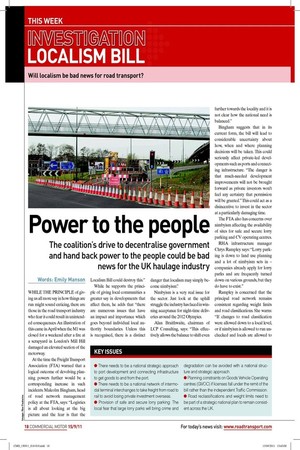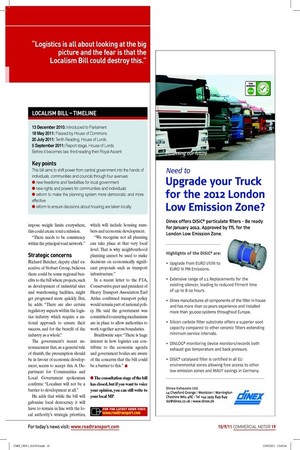Power to the people
Page 15

Page 16

If you've noticed an error in this article please click here to report it so we can fix it.
The coalition’s drive to decentralise government and hand back power to the people could be bad news for the UK haulage industry
Words: Emily Manson
WHILE THE PRINCIPLE of giving us all more say in how things are run might sound enticing, there are those in the road transport industry who fear it could result in unintended consequences. An illustration of this came in April when the M1 was closed for a weekend after a ire at a scrapyard in London’s Mill Hill damaged an elevated section of the motorway.
At the time the Freight Transport Association (FTA) warned that a logical outcome of devolving planning powers further would be a corresponding increase in such incidents. Malcolm Bingham, head of road network management policy at the FTA, says: “Logistics is all about looking at the big picture and the fear is that the Localism Bill could destroy this.” While he supports the principle of giving local communities a greater say in developments that affect them, he adds that “there are numerous issues that have an impact and importance which goes beyond individual local authority boundaries. Unless this is recognised, there is a distinct danger that localism may simply become nimbyism”.
Nimbyism is a very real issue for the sector. Just look at the uphill struggle the industry has faced in winning acceptance for night-time deliveries around the 2012 Olympics.
Alan Braithwaite, chairman of LCP Consulting, says: “This effectively allows the balance to shift even further towards the locality and it is not clear how the national need is balanced.” Bingham suggests that in its current form, the bill will lead to considerable uncertainty about how, when and where planning decisions will be taken. This could seriously affect private-led developments such as ports and connecting infrastructure. “The danger is that much-needed development improvements will not be brought forward as private investors won’t feel any certainty that permission will be granted.” This could act as a disincentive to invest in the sector at a particularly damaging time.
The FTA also has concerns over nimbyism affecting the availability of sites for safe and secure lorry parking and CV operating centres.
RHA infrastructure manager Chrys Rampley says: “Lorry parking is down to land use planning and a lot of nimbyism sets in – companies already apply for lorry parks and are frequently turned down on various grounds, but they do have to exist.” Rampley is concerned that the principal road network remains consistent regarding weight limits and road classiications. She warns: “If changes to road classiication were allowed down to a local level, or if nimbyism is allowed to run unchecked and locals are allowed to impose weight limits everywhere, this could create total confusion. “There needs to be consistency within the principal road network.”
Strategic concerns
Richard Butcher, deputy chief executive of Stobart Group, believes there could be some regional beneits to the bill where projects, such as development of industrial sites and warehousing facilities, might get progressed more quickly. But, he adds: “There are also certain regulatory aspects within the logistics industry which require a national approach to ensure their success, and for the beneit of the industry as a whole”.
The government’s recent announcement that, as a general rule of thumb, the presumption should be in favour of economic development, seems to accept this. A Department for Communities and Local Government spokesman conirms: “Localism will not be a barrier to development at all.” He adds that while the bill will galvanise local democracy it will have to remain in line with the local authority’s strategic priorities, which will include housing numbers and economic development.
“We recognise not all planning can take place at that very local level. That is why neighbourhood planning cannot be used to make decisions on economically signiicant proposals such as transport infrastructure.” In a recent letter to the FTA, Conservative peer and president of Heavy Transport Association Earl Attlee conirmed transport policy would remain part of national policy. He said the government was committed to ensuring mechanisms are in place to allow authorities to work together across boundaries.
Braithwaite says: “There is huge interest in how logistics can contribute to the economic agenda and government bodies are aware of the concerns that the bill could be a barrier to this.” ■
• The consultation stage of the bill has closed, but if you want to voice your opinion, you can still write to your local MP.
FOR THE LATEST NEWS VISIT:
www.roadtransport.com













































